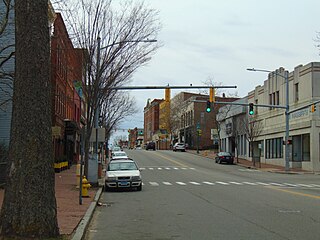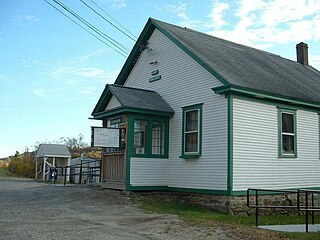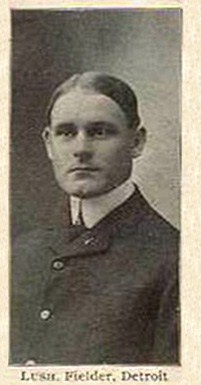
Willimantic is a census-designated place located in the town of Windham in Windham County, Connecticut, United States. It is a former city and borough, and is currently organized as one of two tax districts within the Town of Windham. Willimantic is part of the Southeastern Connecticut Planning Region. Known as "Thread City" for the American Thread Company's mills along the Willimantic River, it was a center of the textile industry in the 19th century. Originally incorporated as a city in 1893, it entered a period of decline after the Second World War, culminating in the mill's closure and the city's reabsorption into the town of Windham in the 1980s. Heroin use, present since the 1960s, became a major public health problem in the early 2000s, declining somewhat by the 2010s. Though the city was a major rail hub, an Interstate Highway has never passed within ten miles, despite early plans to connect it.

Cheshire is a town in Berkshire County, Massachusetts, United States. It is part of the Pittsfield, Massachusetts Metropolitan Statistical Area. The population was 3,258 at the 2020 census.

Clarksburg is a town in Berkshire County, Massachusetts, United States. It is part of the Pittsfield, Massachusetts Metropolitan Statistical Area. The population was 1,657 at the 2020 census.

Dalton is a town in Berkshire County, Massachusetts. Dalton is a transition town between the urban and rural portions of Berkshire County. It is part of the Pittsfield, Massachusetts Metropolitan Statistical Area. The population was 6,330 at the 2020 census.

New Ashford is a town in Berkshire County, Massachusetts, United States. It is part of the Pittsfield, Massachusetts Metropolitan Statistical Area. The population was 250 at the 2020 census.

North Adams is a city in Berkshire County, Massachusetts, United States. It is part of the Pittsfield, Massachusetts Metropolitan Statistical Area. Its population was 12,961 as of the 2020 census. Best known as the home of the largest contemporary art museum in the United States, the Massachusetts Museum of Contemporary Art, North Adams has in recent years become a center for tourism, culture and recreation.

Savoy is a town in Berkshire County, Massachusetts, United States. It is part of the Pittsfield, Massachusetts Metropolitan Statistical Area. The population was 645 at the 2020 census.

Lee is a town in Berkshire County, Massachusetts, United States. It is part of the Pittsfield, Massachusetts, metropolitan statistical area. The population was 5,788 at the 2020 census. Lee, which includes the villages of South and East Lee, is part of the Berkshires resort area.

Williamstown is a town in the northwest corner of the Commonwealth of Massachusetts in the United States. It shares a border with Vermont to the north and New York to the west. Located in Berkshire County, the town is part of the Pittsfield, Massachusetts metropolitan statistical area. The population was 7,513 at the 2020 census. A college town, it is home to Williams College, the Clark Art Institute and the Tony-awarded Williamstown Theatre Festival.

Adams is a town in northern Berkshire County, Massachusetts, United States. It is part of the Pittsfield, Massachusetts Metropolitan Statistical Area. The population was 8,166 at the 2020 census.

Lenox is a town in Berkshire County, Massachusetts, United States. The town is based in Western Massachusetts and part of the Pittsfield Metropolitan Statistical Area. The population was 5,095 at the 2020 census. Lenox is the site of Shakespeare & Company and Tanglewood, summer home of the Boston Symphony Orchestra. Lenox includes the villages of New Lenox and Lenoxdale, and is a tourist destination during the summer.

Arthur Howe was an American football player and coach, teacher, minister and university president. He played college football for Yale University from 1909 to 1911, was the quarterback of Yale's 1909 national championship team, and was a consensus first-team All-American in 1912. He was the head coach of the 1912 Yale football team. Howe was later ordained as a Presbyterian minister and taught at Eastern preparatory schools and at Dartmouth College. From 1930 to 1940, he was the president of Hampton University. He was posthumously inducted into the College Football Hall of Fame in 1973.

William Lucas Lush was an American baseball player and college athletics coach and administrator. He played seven seasons of Major League Baseball from 1895 to 1904, including three with the Washington Senators. He later worked as a college athletics coach at Yale University, Columbia University, Fordham University, the United States Naval Academy, St. John's University, the University of Baltimore and Trinity College, Hartford. He also held athletic director positions at Fordham and the Naval Academy. In the 1930s, he coached athletic teams at Sing Sing prison in Ossining, New York.

Kelton Bedell Miller was an American journalist and politician who served as Mayor of Pittsfield, Massachusetts. Miller was the owner and publisher of The Berkshire Eagle for 47 years. The Miller Building, built in 1912 in Pittsfield, Massachusetts, and now home to The Berkshire County Juvenile Court, is named after Kelton Miller.

John W. Field was an American football player and coach. Field played college football for Yale University from 1908 to 1910 and was captain of Yale's football team. He also served as the head coach of the 1911 Yale football team. He later worked for more than 60 years as manufacturer of corsets and lingerie.

Thomas James Riley was an American football player and coach and attorney. He played football for the University of Michigan and coached football for the University of Maine (1910–1913) and Amherst College (1914–1916).

The Boston mayoral election of 1899 occurred on Tuesday, December 12, 1899. Republican candidate and former mayor of Boston Thomas N. Hart defeated Democratic candidate Patrick Collins, and two other contenders, to become mayor for the second time. Incumbent mayor Josiah Quincy had announced in July 1899 that he would not seek re-election.

The Boston mayoral election of 1854 saw the reelection of incumbent mayor Jerome V. C. Smith. It was held on December 11, 1854.

Massachusetts House of Representatives' 1st Berkshire district in the United States is one of 160 legislative districts included in the lower house of the Massachusetts General Court. It covers part of Berkshire County. Democrat John Barrett of North Adams has represented the district since 2017.



















